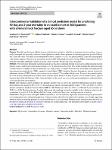Item Infomation
Full metadata record
| DC Field | Value | Language |
|---|---|---|
| dc.contributor.author | Jacobien H. F., Oosterhoff | - |
| dc.contributor.author | Aditya V., Karhade | - |
| dc.contributor.author | Olivier Q., Groot | - |
| dc.date.accessioned | 2023-03-23T02:52:11Z | - |
| dc.date.available | 2023-03-23T02:52:11Z | - |
| dc.date.issued | 2023 | - |
| dc.identifier.uri | https://link.springer.com/article/10.1007/s00068-023-02237-5 | - |
| dc.identifier.uri | https://dlib.phenikaa-uni.edu.vn/handle/PNK/7083 | - |
| dc.description | CC BY | vi |
| dc.description.abstract | Mortality prediction in elderly femoral neck fracture patients is valuable in treatment decision-making. A previously developed and internally validated clinical prediction model shows promise in identifying patients at risk of 90-day and 2-year mortality. Validation in an independent cohort is required to assess the generalizability; especially in geographically distinct regions. Therefore we questioned, is the SORG Orthopaedic Research Group (SORG) femoral neck fracture mortality algorithm externally valid in an Israeli cohort to predict 90-day and 2-year mortality? | vi |
| dc.language.iso | en | vi |
| dc.publisher | Springer | vi |
| dc.subject | Orthopaedic Research Group | vi |
| dc.subject | generalizability | vi |
| dc.title | Intercontinental validation of a clinical prediction model for predicting 90-day and 2-year mortality in an Israeli cohort of 2033 patients with a femoral neck fracture aged 65 or above | vi |
| dc.type | Book | vi |
| Appears in Collections | ||
| OER- Y học- Điều dưỡng | ||
Files in This Item:

